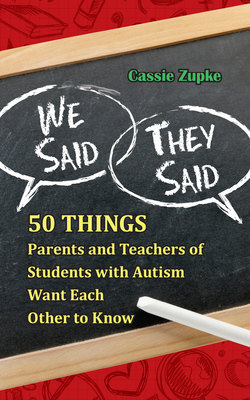Читать книгу We Said, They Said - Cassie Zupke - Страница 18
На сайте Литреса книга снята с продажи.
Оглавление
Sometimes, when I go to pick my child up after school and see him walking next to his typically developing classmates, I cry.
The other kids move like fish in a school, each traveling their own trajectory but with a sameness of movement that comes with typical development. Boys rush headlong or do the pre-puberty strut. Girls dart around in giggly groups. Adolescents saunter along as if they are establishing their territory with each step. They call out to one another and laugh, exchanging gossip and doing the social dance that dominates their world.
My son walks through the other kids as though they are bits of landscape. With his weight balanced forward on his toes and his rigid gait, he navigates the crowd in a world of his own. Other people are obstacles to him—he pays enough attention to avoid collisions but doesn't look at their faces. Subtle social clues are lost on him; even overt gestures often go unnoticed. A child who waves at him doesn't register unless the kid speaks loudly enough to get his attention. Smiles of friendship, raised eyebrows, smirks of derision—they pass him by undigested and uninterpreted.
The kids from my son's class last year are among the crowd. I see how they've grown, matured, and taken steps toward joining the adult world of having relationships and responsibilities. Their clothing tastes have changed. The girls' skirts are shorter, the boys' pants baggier. I see makeup and whiskers. And boobs.
My son is wearing his favorite sweatshirt—the same one he's worn for years. It's zipped to his chin with the hood up, even though it's a warm day. The sweatshirt is blue, and it gives him comfort—it's a security blanket that helps my son keep himself contained. I love that he loves it. But I hate that he still needs it.
I am proud of my son, and I'm so very proud of all the things he's accomplished, even with his difficulties. He's grown and matured and is on the path to adulthood, with whatever that may bring. He is different, and I've accepted that. I love him for who he is and no longer miss the boy he might have been. Yet some days, I still cry.
